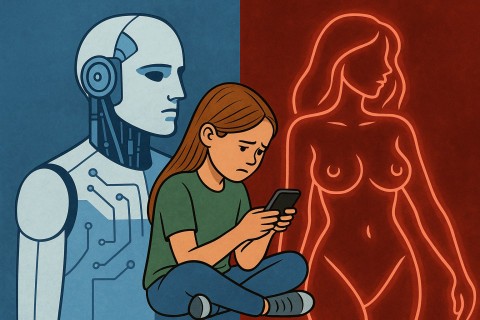The Unfiltered Web: A Minefield for Young Minds
The internet, once hailed as a gateway to knowledge, has also become a hallway of hidden doors some educational, others deeply troubling. As parents, educators, and society at large debate how to protect minors online, two key issues spark intense concern: the ubiquity of sexual content and the quiet infiltration of artificial intelligence (AI) into daily life.
While one is often shamed, restricted, and heavily censored, the other is celebrated, adopted, and woven into the fabric of education and entertainment. But which of these poses a more lasting threat to the minds of children?
Let’s examine both.
The Impact of Exposure to Nudity and Sexual Content
Pros – If Any Exist?
Some argue that age-appropriate sex education, even when delivered digitally, can foster body positivity, consent awareness, and reduce shame. In controlled environments, nudity isn't inherently harmful think art, science, or medical education.
However, that’s not what most children encounter.
Cons – Emotional Distortion and Premature Sexualization
-
Unrealistic Expectations: Pornography often portrays a distorted version of sex, relationships, and body image. Young viewers may internalize harmful messages about dominance, submission, and beauty standards.
-
Emotional Confusion: Children exposed too early may associate intimacy with shame, secrecy, or fear.
-
Desensitization: Repeated exposure to explicit material can blunt emotional responses and delay healthy emotional development.
-
Predatory Risks: Adult platforms or social media can serve as hunting grounds for grooming or exploitation.
While much is done to restrict access filters, parental controls, legislation the truth is that curiosity often outpaces protection.
Artificial Intelligence: The Silent Influence
Pros – Innovation, Learning & Accessibility
AI can be an incredible tool for education and creativity. It powers:
-
Language learning apps,
-
Homework assistance,
-
Accessibility for kids with disabilities,
-
Fun tools like drawing generators or interactive storytelling.
In the right context, AI empowers kids to learn faster, think critically, and create boldly.
Cons – Manipulation, Dependency & Identity Erosion
But AI’s dangers are more subtle and in some ways, more insidious.
-
Data Harvesting: Children unknowingly feed massive amounts of personal data into AI systems. Their habits, faces, voices, and interests are collected, often without true consent.
-
Addiction & Dissociation: AI-driven platforms are designed to maximize engagement, creating dopamine loops that trap children in endless scrolling or gaming.
-
Eroded Reality: With deepfakes, AI-generated influencers, and bots simulating human interaction, kids may struggle to distinguish real from artificial, authentic from manufactured.
-
Intellectual Laziness: Reliance on AI for thinking, writing, or solving problems may hinder creativity and critical thinking, creating a generation that outsources rather than learns.
-
Behavioral Shaping: Algorithms can manipulate opinions and interests, subtly guiding kids toward products, ideologies, or behaviors without their awareness.
Unlike pornographic material, AI isn’t hidden in a dark corner of the web it’s on every phone, in every classroom, often disguised as "helpful technology."
Which One Faces Scrutiny and Which One Gets a Free Pass?
Here lies the real irony: One of these dangers is censored, policed, and criminalized the other is marketed as a feature.
-
Explicit content is flagged, filtered, and often rightly criticized.
-
Meanwhile, AI sits quietly in the background, shaping thoughts, feeding content, and growing smarter by the second.
Despite AI's growing presence, its impact on child development remains largely unregulated and poorly understood by the very adults tasked with protecting children.
A Cultural Blind Spot?
This is not a call to minimize the harms of early sexual exposure. Those effects are real and serious.
But we must ask: Why is one danger hunted down while the other is embedded in school apps and bedtime stories?
We worry (sometimes obsessively) about what children see, but rarely about what they absorb subtly, passively, algorithmically.
Perhaps it’s easier to point fingers at sex than to confront our reliance on technology.
But if we’re serious about protecting young minds, we must stop pretending that nudity is the only danger, and start looking harder at the glowing, talking, personalized assistant sitting in every child's pocket.
Because it may not be showing skin but it’s definitely reprogramming minds.













